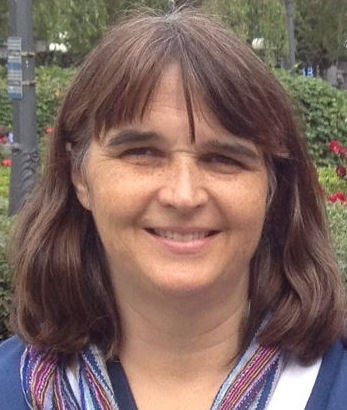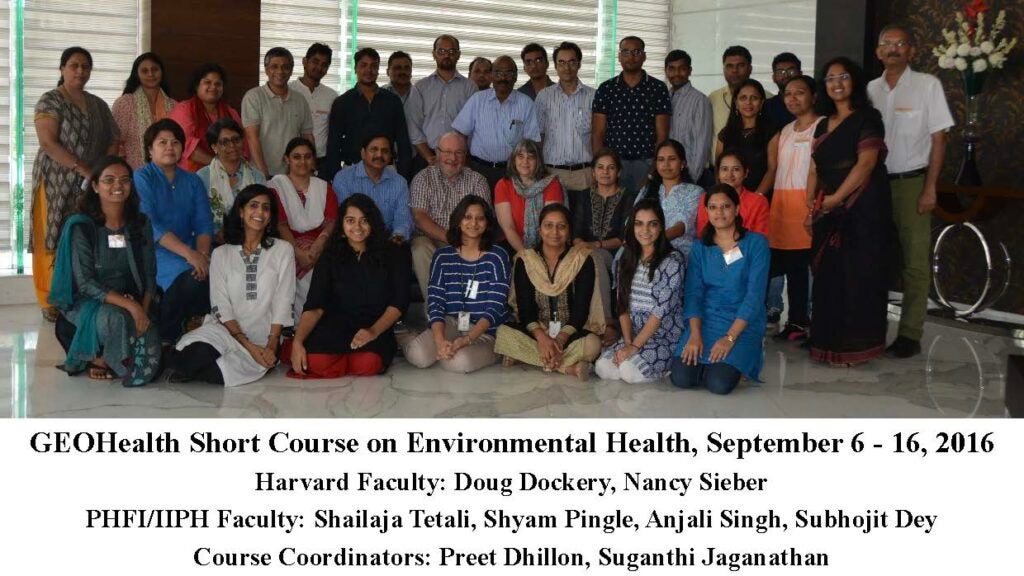India Research Center
The India Research Center, based in Mumbai, serves as a hub for Harvard Chan School’s research projects, educational programs, and knowledge translation and communication work across India.
Dextrus, 6th floor,
Peninsula Towers,
Peninsula Corporate Park,
Lower Parel, Mumbai 400013
India
Faculty Spotlight: Dr Nancy Long Sieber
Prof Nancy Sieber shares about her work on Environmental Health in India, February 2025

Nancy Sieber has been at the Harvard T.H. Chan School of Public Health for more than three decades, and her work has involved teaching and research related to environmental health, especially the health effects of air pollution. For the past 12 years, her work has taken her to India.
After completing her PhD in Physiology at the University of Michigan, and a post- doctoral fellowship in Japan, Nancy joined the Department of Environmental Health as a post doctoral fellow, working with Dr. Stephanie Shore on mechanisms of pulmonary inflammation. She went on to work with Prof. Joe Brain on a number of research projects that centered on how environmental exposures affect the lungs, as well as administrative tasks related to environmental health. Her teaching centers on physiology and pathophysiology.
Nancy’s interest in India began when she started working with Joe Brain on the Lown Scholars Program. Joe was Director of the program, and she was Executive Director from 2011 – 2016. This program, which was created by cardiologist and Nobel Peace Prize winner Dr. Bernard Lown, who passed away in Feb 2021, was designed to build a cadre of researchers and policy makers in LMICs whose work focused on prevention of cardiovascular disease.
Dr. Lown was dismayed by the “brain drain” of talented scientists and clinicians from South Asia, Africa and other regions, depriving these countries of their much-needed expertise. In particular, he regretted that so many of these researchers trained in the US or other wealthy countries, and then stayed on, as they were drawn to the abundant opportunities to carry out cutting-edge research. The Lown Scholars Program is designed to create opportunities for scientists from LMICs to spend time at HSPH working with a mentor to design and carry out a research project in their home countries that related to cardiovascular disease prevention. By offering support and a community of like-minded scholars, the Program has been successful in building academic and policy strength in LMICs. The Lown Scholars Program has been led by Prof. Goodarz Danaei since 2016.
As part of that program, Nancy traveled with Lown Scholars to India to participate in an HSPH January term course, which was organized by Dr. Richard Cash and taught at the Public Health Foundation of India in Delhi. The Lown Scholars joined HSPH students in this program. They participated in lectures and visited local institutions that developed strategies and implemented policies to prevent heart disease and other chronic conditions. She found her first visit to India in January 2013 overwhelming – the crowds, the noise, the air pollution. But Nancy said that with her return in January 2014, “I was hooked. There was so much to explore, and it was a pleasure to share it with the Lown Scholars and the HSPH students.” She has returned to India almost every year since then.

The GEOHealth Program (Global Environmental and Occupational Health) is administered by the Fogarty International Center, which is part of NIH. The Program was announced in 2012, and the first call for applications was in 2014. GEOHealth is a capacity-building program, that endeavors to increase teaching and research into environmental health into Each GEOHealth grant is a partnership between one US academic institution and one institution in an LMIC. Each partnership is a “hub”, and the hubs are all part of the larger GEOHealth network. The first round of GEOHealth grants, which ran from 2015 – 2019, included seven hubs that were based at institutions in Bangladesh, Ethiopia, Ghana, India, Peru, Suriname and Thailand. In each case, there is a research grant awarded to the LMIC, and a training grant awarded to the US institution. The US institution design training programs for the LMIC, which typically includes offering short courses and targeted trainings in the LMIC, and mentored training for students and scientists from the LMIC who stay for periods of weeks to months at US institution. Some trainees are able to earn graduate degrees at the US institutions. The PIs for the first GEOHealth training grant were Richard Cash and Prof. Joel Schwartz. Profs. Dorairaj Prabhakaran and Shrinath Reddy were the Indian PIs, and the research focus was on the health effects of air pollution. The title of the grantwas “Air Pollution and Health GeoHealth Hub Research and Capacity Building-US.”
The second round of GEOHealth funding was offered in 2021. Funding began in 2022, and will continue until Feb 2027. The current hubs are India, Bangladesh, Mongolia, Peru, East Africa, and two in the Middle East / North Africa, one based in Lebanon and the other in Jordan. The PIs for the Indian training grant are Nancy Long Sieber and Prof. Joel Schwartz, and the Indian PIs were Profs. Dorairaj Prabhakaran and Shrinath Reddy for the first 3 years of the grant. Dr. Poornima Prabhakaran will be taking on Dr. Reddy’s role in the final years. This time the focus of the Indian research is on a wider range of environmental exposures, and how they affect health at different life stages. The title is “GEOHealth Health Effects of Selected Environmental Exposomes Across the Life CourSe (HEALS)-India”. In this grant cycle we have focused on expanding the number of courses taught by HSPH faculty, and on teaching the courses at a wider range of locations across India. We’ve also invited trainees to spend a full semester at HSPH, where they sit in on classes, and work with a mentor to design a research project that they will carry out when they return to India. We have also offered training in the Master’s program in Environmental Health. The goal of these efforts is to encourage physicians and public health specialists to incorporate knowledge from studies of environmental health into their patient care and research. Ultimately, the aim of GEOHealth is to expand.

In the course of her work with GEOHealth, Nancy has contributed to classes taught in New Delhi, Gurgaon, Durg (in Chhattisgarh), Ahmedabad, Hyderabad, Kochi and Bhubaneswar. Nancy has said, “I’m looking forward to my next visit to India. I learn so much from each visit, and I appreciate the warm hospitality that always greets me.” More about GEOHealth Program can be found on: https://www.geohealthindia.org